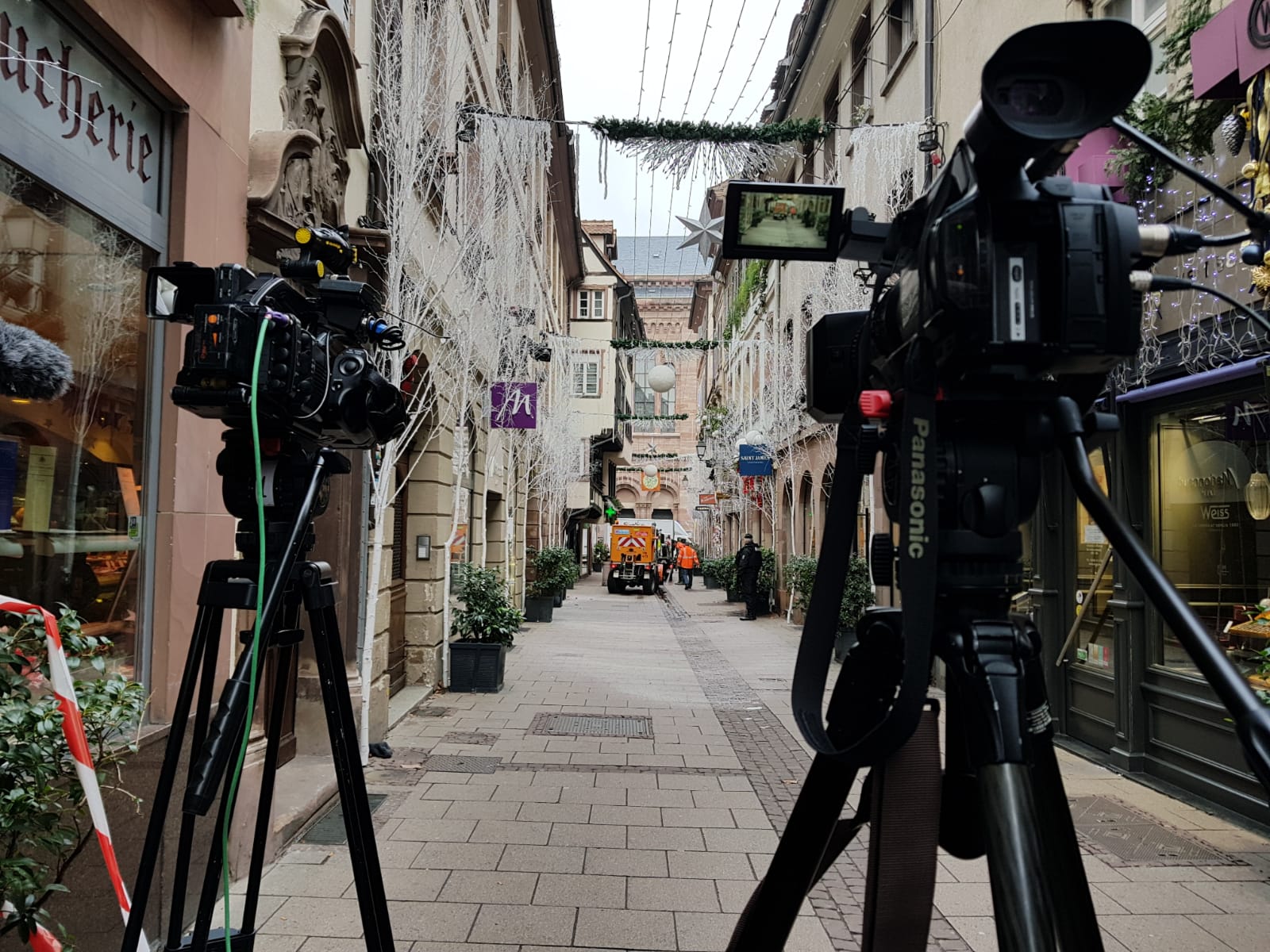ALONG THE STREETS OF THE CITY
Silence and sadness fell on the Alsatian city after the attack in rue des Orvèvres. The bells of the cathedral are rung out to call the faithful to prayer. Gendarmes and military patrol every corner of the city. Local inhabitants are still afraid, they continue talking about the incident. Taciturn and cautious tourists stroll along. The European Parliament, located at a short distance from the city centre, has resumed its activity. Violence, we are told, must not stop democracy or mortify freedom.

(from Strasbourg) The melancholy sound of the bell chimes in Strasbourg’s Cathedral. For ten minutes, starting at 12, the death-knell draws our gaze to the 142-mt peak of the ancient gothic bell tower, a symbol of the Alsatian city, wounded to death last evening by the attack in rue des Orvèvres, a few blocks away from the central square.
In the early morning the luxury shopping street was mercifully cleaned up from the blood of the victims. The blankets that covered the corpses have been removed.
Not much is known of the attacker, 29-year-old Chérif Chekatt, hunted by the police. Investigators are probing the reasons that caused the bloodshed in the “Christmas capital” (as Strasbourg prides to call itself). In the morning the Prefecture of the Grand East released a new bulletin – described as “provisional” – on the death toll and the number of casualties admitted in hospital, several of whom are in serious conditions. Among them, young Italian journalist Antonio Megalizzi. The mayor held a press conference with updates on the situation in the city. The investigation is ongoing, the first charges have been issued. The archbishop, Monsignor Luc Ravel, declared: “once again we were victims of terrorist violence. Terror attacks hit Strasbourg, a capital of Europe. Wounds were inflicted on our beautiful city, on the Alsatian region, on France, on Europe and on the whole of humanity.”
The European Parliament located nearby, where the plenary meeting was taking place, held a minute of silence for the victims.
Now only flowers placed in silence are what still remains on the cobblestones of rue des Orvèvres
Marta, a Strasbourg citizen living nearby, stops and remains silent for a few minutes. Her gaze rests on the flowers. She then kindly answers the journalist’s questions: “I was at home, I heard gunfire, and especially screams. They were dreadful. I opened the window and saw people running. A young woman was pulling out her hair in desperation. I broke out in tears. I immediately realized that I was facing a tragedy.” She does not mention terrorism. Also law enforcement authorities are cautious. Marta, no longer young, has only a veiled, dignified sadness in her eyes.
The atmosphere in the city centre is surreal. A muffled silence prevails here and there, few voices are heard. The silence is interrupted by the clamour of the gendarmes and of the many journalists and camera operators. Tourists steer clear: shops have reopened for them, even those located a few meters’ away from the site of the attack. In the nearby café bearing a sign in Italian a group of elderly men exchange remarks on the incident. Just a few words. Marc has a beer in his hands: “I still don’t know how many died or were wounded, I don’t know whether they captured that criminal. But here, in this peaceful city, we are not used to all of this. People want to live in peace, tourists come to visit our Christmas markets. But perhaps in Strasbourg the holidays are already over.”
Some onlookers stop by. Behind the corner a young shop assistant is speaking of what she eye-witnessed the previous evening in front of a video camera:
“gun shots, people screaming, it was crasy – she mumbled -. All of a sudden we heard the sirens, the police, then it all stopped, everything fell silent.”
This is usually a very busy street: the Maison de Hanssen & Gretel, one of the city’s attractions, is a few steps away from the flower bouquets. On the opposite side the winstub Le clou, the renowned confectionery Naegel, further ahead stands the wine bar Nicolas. The death knell sounds at midday. Everything stops, all voices fall silent. The police guard lowers his assault rifle and takes off his hat.
In the meantime the European Parliament resumed its activity, later than usual, around 10.00. Last evening the Louise Weiss building was on lock-down for several hours. Those who were inside – like myself – were locked in since the moment of the attack. “The doors are closed. Nobody can go out or get in”, security agents kept on repeating. Then shortly after 02.00 am, EP President Antonio Tajani invited all MEPs to gather in the hemicycle where he explained the situation and reassured them that they would be returning home or to their hotels by bus or by taxi, escorted by the police.
I left the Parliament building shortly before 05.00 am. A taxi-driver, worried about the incident and for his business, left me off at a great distance from the central district where I live. From that point on all access to cars had been closed off. I walked a long way, meeting only policemen and military patrolling the streets. There was just the usual beggar stationed at the beginning of rue des Frères. He is known to everyone, he holds open the lateral doors of the cathedral to pilgrims and visitors, who give him some coins. He too perceives a different air tonight: “nobody passed by this evening. Only a few youths who told me about the shooting. I’m staying here, I have nowhere else to go. I will say a prayer.”
Silence and cold temperatures envelop everything. Life restarts today, in spite of everything.